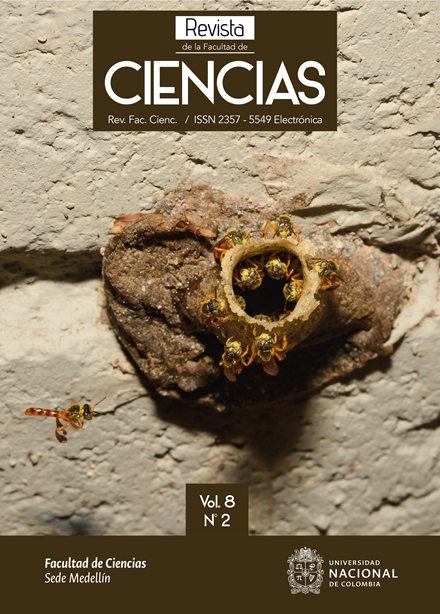Los estudios de diseño una metodología de investigación novedosa para la educación
Design studies a new research methodology for education
DOI:
https://doi.org/10.15446/rev.fac.cienc.v8n2.79267Palabras clave:
Estudios de diseño, Metodología de investigación, Ambientes de aprendizaje, Eseñanza-aprendizaje (es)Design studies, Research methodology, Learning environments, Teaching-learning (en)
Descargas
Referencias
Ackerman, E. (1995). Construction and transference of meaning through form. In L. P. a. G. Steffe, J. (Ed.). Constructivism in education (pp. 341–354). Hillsdale, NJ.
Alzaghibi, M. A. (2010). Instructional Design: Development, implementation and evaluation of a teaching sequence about plant nutrition in Saudi. University of Leeds.
Brown, A. L. & Campione, J. C. (1996). Psychological theory and the design of innovative learning environments: On procedures, principles, and systems. In L. Schauble & R. Glaser (Eds.), Innovations in learning: New environments for education (pp. 289–298). Mahwah, NJ: Lawrence Erlbaum Associates, Inc.
Brown, A. L. (1990). Domain‐specific principles affect learning and transfer in children. Cognitive science, 14(1), 107-133.
Brown, A. L. (1992). Design experiments: theoretical and methodological challenges in creating complex interventions in classroom settings. Journal of the Learning Sciences, 2(2), 141-178.
Cobb, P. (2000). Conducting teaching experiments in collaboration with teachers. In Kelly, A. E. & Lesh, R.A. (Eds.), Handbook of research design in mathematics and science education (pp. 307–333). Mahwah, NJ: Lawrence Erlbaum Associates.
Cobb, P., Confrey, J., diSessa, A., Lehrer, R. & Schauble, L. (2003). Design experiments in Educational Research. Educational Researcher, 32(1), 9-13.
Cohen, D. K., Raudenbush, S. W., & Ball, D. L. (2003). Resources, instruction, and research. Educational evaluation and policy analysis, 25(2), 119-142.
Collins, A. (1992). Toward a design science of education. In E. Scanlon & T. O’Shea (Eds.), New directions in educational technology (pp.15– 22). Berlin: SpringerVerlag.
Collins, A. (1998). Learning communities: Comments on papers by Brown, Campione and Ellery and by Riel. In J. G. Greeno and S. Goldman (Eds.). Thinking pratices. Mahwah N J: Erlbaum.
Collins, A., Joseph, D. & Bielaczyc, K. (2004). Design research: Theoretical and methodological issues. Journal of the Learning Sciences, 13(1), 15-42.
Confrey J. (2006). The Evolution of Design Studies as Methodology. The Cambridge Handbook of the Learning Sciences. pp. 135-152.
Confrey, J., & Stohl, V. (Eds.). (2004). On evaluating curricular effectiveness: Judging the quality of k-12 mathematics evaluations.Washington, DC: National Academy Press.
Elmore, R. F. (1996). Getting to scale with good educational practice. Harvard Educational Review, 66(1), 1–26.
Fernandez, C., & Yoshida, M. (2004). Lesson study: A Japanese approach to improving mathematics teaching and learning. Mahwah, NJ: Lawrence Erlbaum Associates.
Gee, J. P. (1999). An introduction to discourse analysis: Theory and method. New York: Routledge.
Karplus, R. & Their, H. D. (1967). A new look a elementary school science. Rand McNally. Chicago, IL.
Kegan, R. (2000). What “form” transforms? A constructive developmental approach to transformative learning. In J. Mezirow & Associates (Eds.), Learning as transformation: Critical perspectives on atheory in progress (pp.35–69). San Francisco: Jossey-Bass.
Lagemann, E. C. (2002a). Usable knowledge in education. Retrieved November 29, 2005, from the Spencer Foundation Web site: www.spencer.org/publications/index.htm.
Lagemann, E. C. (2002b). An elusive science: The troubling history of education research. Chicago: University of Chicago Press.
Millar, R., A. Tiberghien., A & Maréchal J. (2002). Varieties of labwork: A way of profiling labwork tasks. In. Psillos, D. and Niedderer, H. (eds.), Teaching and learning in the science laboratory. Dordrecht: Kluwer Academic Publications, (pp. 9–20).
National Research Council (NRC). (1996). National Research Council. National Science Education Standards. Washington DC: National Academy Press.
Piaget, J. (1974). The child and reality: Problems of genetic psychology (A. Rosin, Trans.). London: Frederick Miller.
Shavelson, R. J. & Towne, L. (Eds.). (2002). Scientific research in education. Washington, DC: National Academy Press.
Shavelson, R. J., Phillips, D. C., Towne, L. & Feuer, M. J. (2003). On the science of education design studies. Educational Researcher, 32 (1), 25–28.
Shwartz, Y., Weizman, A., Fortus, D., Krajcik, J. & Reiser, B. (2008). Middle School Science Curriculum: Coherence as a Design Principle. A paper presented at the annual meeting of the National Association of Research in Science Teaching, March, 2008 Baltimore.
Simon, H. A. (1969). The sciences of the artificial. Cambridge, MA: MIT Press.
The Design-Based Research Collective (2003). Design-based research: An emerging paradigm for educational enquiry. Educational Researcher, 32 (1), 5-8.
Vygotsky, L.S. (1978) Mind in Society: The development of higher psychological processes. Cambridge, MA: Harvard University Press.
Cómo citar
APA
ACM
ACS
ABNT
Chicago
Harvard
IEEE
MLA
Turabian
Vancouver
Descargar cita
CrossRef Cited-by
1. Boris Fernando Candela Rodríguez. (2023). La investigación basada en el diseño y el desarrollo curricular en la educación en ciencias. Bio-grafía, 16(31) https://doi.org/10.17227/bio-grafia.vol.16.num31-19727.
Dimensions
PlumX
Visitas a la página del resumen del artículo
Descargas
Licencia
Derechos de autor 2019 Revista de la Facultad de Ciencias

Esta obra está bajo una licencia internacional Creative Commons Atribución-NoComercial-SinDerivadas 4.0.
Los autores o titulares del derecho de autor de cada artículo confieren a la Revista de la Facultad de Ciencias de la Universidad Nacional de Colombia una autorización no exclusiva, limitada y gratuita sobre el artículo que una vez evaluado y aprobado se envía para su posterior publicación ajustándose a las siguientes características:
1. Se remite la versión corregida de acuerdo con las sugerencias de los evaluadores y se aclara que el artículo mencionado se trata de un documento inédito sobre el que se tienen los derechos que se autorizan y se asume total responsabilidad por el contenido de su obra ante la Revista de la Facultad de Ciencias, la Universidad Nacional de Colombia y ante terceros.
2. La autorización conferida a la revista estará vigente a partir de la fecha en que se incluye en el volumen y número respectivo de la Revista de la Facultad de Ciencias en el Sistema Open Journal Systems y en la página principal de la revista (https://revistas.unal.edu.co/index.php/rfc/index), así como en las diferentes bases e índices de datos en que se encuentra indexada la publicación.
3. Los autores autorizan a la Revista de la Facultad de Ciencias de la Universidad Nacional de Colombia para publicar el documento en el formato en que sea requerido (impreso, digital, electrónico o cualquier otro conocido o por conocer) y autorizan a la Revista de la Facultad de Ciencias para incluir la obra en los índices y buscadores que estimen necesarios para promover su difusión.
4. Los autores aceptan que la autorización se hace a título gratuito, por lo tanto renuncian a recibir emolumento alguno por la publicación, distribución, comunicación pública y cualquier otro uso que se haga en los términos de la presente autorización.
5. Todos los contenidos de la Revista de la Facultad de Ciencias, están publicados bajo la Licencia Creative Commons Atribución – No comercial – Sin Derivar 4.0.
MODELO DE CARTA DE PRESENTACIÓN y CESIÓN DE DERECHOS DE AUTOR





















